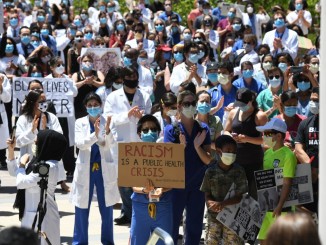
January 22 marked the 50th anniversary of the 1973 landmark US Supreme Court Roe v. Wade decision, in which the Court ruled that people had the right to choose an abortion. But in June 2022, the Supreme Court ruled to overturn Roe v. Wade, upending five decades of legal precedent.
Since then, Republican-controlled state legislatures have rolled back the right to abortion access. Already before the Supreme Court overturned Roe, nearly half of the U.S. states had trigger laws in place to limit abortion access, and 12 states had total abortion bans put in place that made no exceptions for rape or incest.
In 2022, in the state of Texas alone, 58,000 people sought abortions. Where will these people go now? Abortion restrictions predominantly impact poor and working class people, and people of color. Black women are three to four times more likely to experience a pregnancy-related death than white women. While those with more money and access are still able to order abortion medication over the internet, or travel out of state to receive services, this is very difficult to do for workers and the poor.
In addition, several states are introducing new bills to even further restrict abortion access. Traditionally, prosecution for abortions was targeted at medical physicians who perform the abortion, which is still happening in some states. But now some some Republicans are aiming to prosecute pregnant people for seeking abortions. Oklahoma’s Senate introduced a bill recently that would force pregnant people to face charges if they induced an abortion. Missouri is considering legislation that would treat a fetus as a person. Louisiana tried and failed to pass a bill that would treat abortion as murder. There is a growing tension between anti-abortion officials and policymakers because many people living in states with abortion bans can still access reproductive care elsewhere. While abortion rights in many states have been slashed, in some Democratic-controlled state legislatures and cities abortion has been made slightly more accessible, and some services have been put in place to support out-of-state pregnant people to seek care. For example, New York City just made the abortion pill available for free. The city of Nashville, Tennessee has deprioritized the criminalization of abortion-related crimes, and allocated $500,000 dollars to Planned Parenthood. In addition, easing of restrictions have allowed the abortion pill, mifepristone, to be sold in some retail pharmacies, such as CVS and Walgreens.
While increased access in certain states should be celebrated, it is also long overdue. Waystations, such as the one in New Mexico, support people from out of state making the journey to seek abortions with airplane tickets and supplies. However, the most marginalized people in the U.S. often are unaware that these services exist, and have the most difficult time accessing them. So, these waystations are rarely at capacity. The Democrats are trying to use their small measures now to pose as defenders of abortion access. But the Democratic Party had nearly 50 years to make abortion access guaranteed to all without any restrictions, and they never did anything. Even when they had a super-majority in Congress during the Obama administration, the Democrats just sat back and watched as access to abortion was slashed in states all across the country. The Democrats used this issue to win some votes in the 2022 midterm elections, and will likely use it again for the 2024 election, making promises that they never intend to keep.
On this anniversary of Roe, it is important to remember that Roe was won not because of politicians and their promises, but because of grassroots organizing and a mass movement in the streets. And at the same time, Roe was never enough because winning the abstract right to an abortion is not the same as having guaranteed access to abortion services, without any restrictions, which is what’s needed today.




